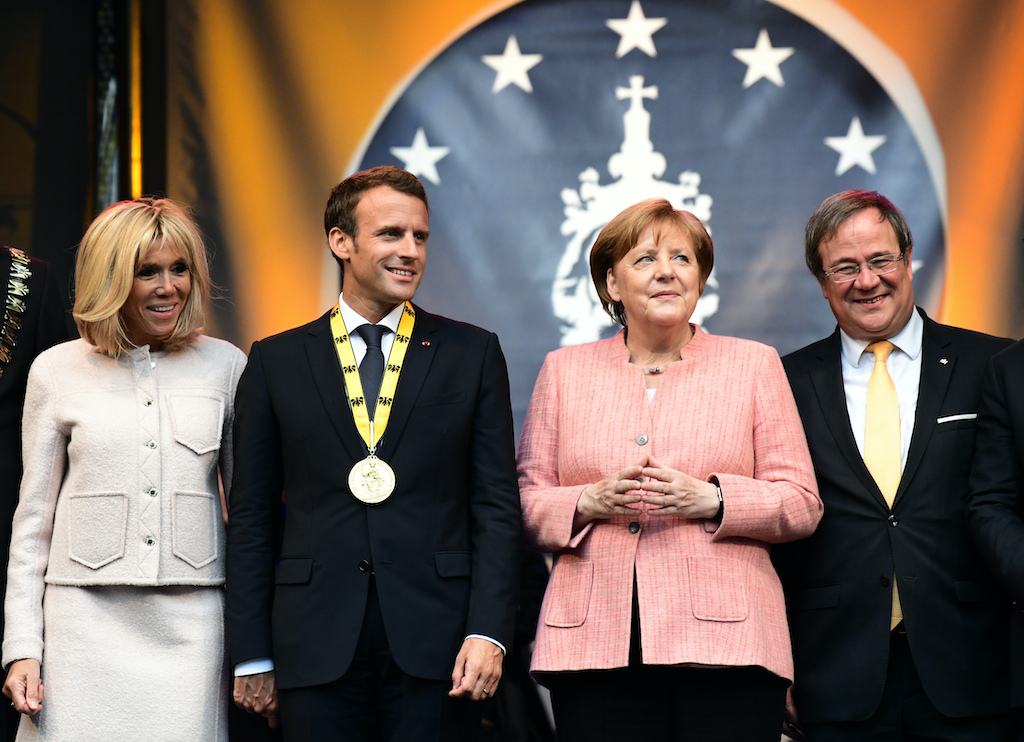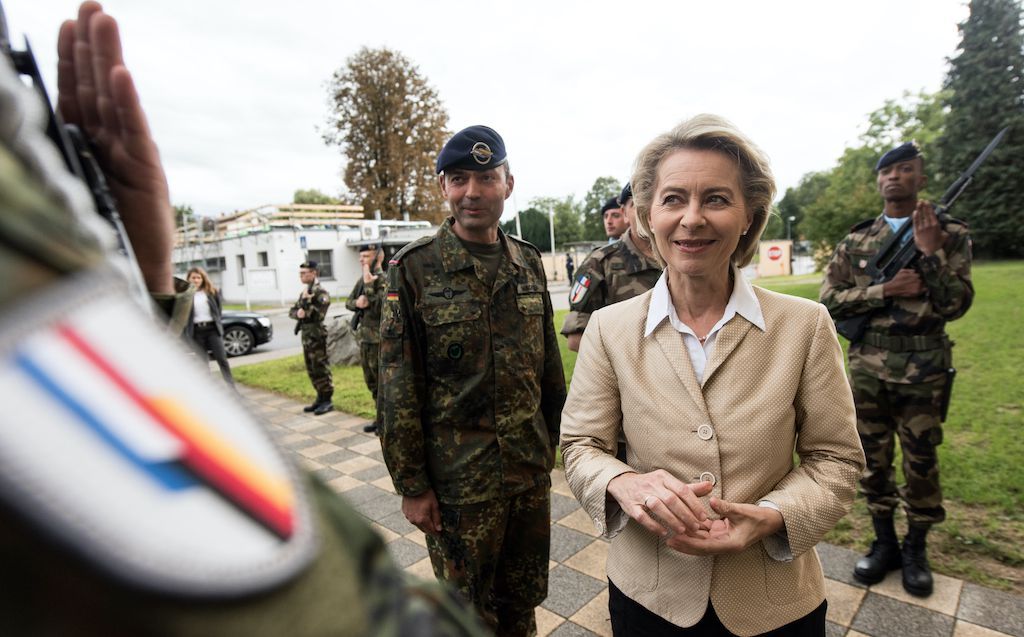Focus Germany: Future of the French-German tandem
Brexit has raised expectations of renewed attempts at joint Franco-German leadership of the EU. However, the EU’s prospects under the Berlin-Paris tandem could depend on compromises between German ordoliberalism and French economic interventionism.

In a nutshell
- France and Germany are finding it difficult to move the European project forward jointly
- Germany’s political fragmentation and the hyperactive leadership of France are further weakening the tandem
- After the Brexit dust settles, Paris and Berlin will both seek to work with London
This first scenario envisages the joint leadership of the European Union by France and Germany as a necessary condition for getting things done in Europe. But times have changed since the historic partnership between German Chancellor Helmuth Kohl and French President François Mitterrand in the 1980s and 1990s. Since that era, the EU has become significantly more fragmented and complex. French and German leaders will have to work harder on building alliances to move the European project forward.
Brexit has raised expectations of renewed attempts at joint Franco-German leadership of the EU. Even before the 2016 Brexit referendum, Britain increasingly left major European initiatives to Berlin and Paris. French President Emmanuel Macron has taken to this leadership role with enthusiasm, broadly supported by Chancellor Angela Merkel of Germany. Mr. Macron is the fourth French president with whom Ms. Merkel has sought to build a solid partnership since her election as chancellor in 2005. France and Germany remain the EU’s two most influential countries despite significant differences in policy and leadership style.
Hand in hand
Recently, the two countries have tried to reinvigorate the cooperation stemming from the 1963 Élysée Treaty, which put an end to postwar animosity and sought common approaches and consultation mechanisms on essential policy issues. In spite of some flaws, their teamwork was decisive in the main EU breakthroughs during subsequent decades. The 2019 bilateral Treaty of Aachen broadened this cooperation following Mr. Macron’s receipt, in the same city, in 2018, of the Charlemagne prize for work on European unification.
The EU’s fate will depend on compromises between German ordoliberalism and French economic interventionism.
At the ceremony, the French president made an eloquent appeal for a recommitment to the “European enterprise.” The agenda ranged from climate to trade, migration and monetary integration as well as security, and defense with an accent on “a Europe that protects.” Mr. Macron effectively offered French domestic reform in exchange for German support of such an ambitious European agenda.
The EU’s other larger member states, Italy, Poland and Spain, mired in populism, euroskepticism, separatism or political crises, were not able to block this renewed Franco-German leadership push. Leaders of smaller member states view the prospect with concern, fearing that, without Britain’s leveling role, the EU’s fate will depend on compromises between German ordoliberalism and French economic interventionism, with their interests shunted aside.
These fears grew with the wheeling and dealing that led to the nomination of a German president of the European Commission, Ursula von der Leyen, and a French president of the European Central Bank (ECB), Christine Lagarde, the EU’s two most powerful positions. Mr. Macron played a crucial role in both nominations, ruffling feathers in the European Parliament. That development also raised questions about domestic support for Germany’s European agenda. The German Social Democrats refused to back Ms. von der Leyen’s nomination obliging the German government to abstain.
Ms. von der Leyen sought to redress the balance by giving more prominence to senior officials from smaller member states, including four of her eight vice-presidents from Central Europe. But the European Parliament’s rejection of Sylvie Goulard, a former French minister, for a top position in the commission, further tarnished the image of the French-German tandem. In an earlier age, the two leaders would have been lauded as kingmakers. This setback delayed the installation of the new commission and raised questions as to the sturdiness of the supposed French-German condominium.
Adrift
This scenario evokes drift and dysfunctionality in relations between Berlin and Paris, as the German political system fragments and France experiences hyperactive, impulsive leadership. This configuration hinders Franco-German leadership of the EU.
Macron wishes the eurozone to become the core of the EU, with more ‘firepower’.
Brexit, which appeared to leave France and Germany in charge of the European project, also sowed discord between them. Germany has more to lose from Brexit than France, notably through disrupted supply chains for industrial goods. Mr. Macron sees opportunities for France from Britain’s departure, especially by attracting financial service providers to Paris. Berlin will pay more into the EU budget after Brexit and demands that its budget rebate be maintained. France, a smaller net contributor, wants the rebate system, originally set up to satisfy Britain, to be eliminated.
Divergences are also apparent in the eurozone. Mr. Macron wishes it to become the core of the EU, with more “firepower.” Berlin hawks, however, oppose this and want any move to bolster the eurozone to be made through intergovernmental measures, despite recent hints at a more cooperative attitude in Berlin on banking union. Above all other matters, German leaders call on eurozone countries to show fiscal responsibility. A skirmish over French proposals for a large eurozone budget and the appointment of a European finance minister ended with a half-hearted compromise.
Such tensions will return at the first sign of another euro crisis. A future German government may not agree to further bailouts. Germany’s ruling Christian Democrats and the “new Hanseatic league” of northern European countries are attached to fiscal prudence and determined that the eurozone should not become a “transfer union.”
Mr. Macron also sees security and defense as key to the EU’s future. After Brexit, France will be the only EU country with nuclear arms and the capacity to project power beyond the EU’s immediate environment. As Germany’s defense minister, Ms. Von der Leyen advocated deeper Franco-German defense cooperation. Yet, German politicians are reluctant to devote more resources to defense and go beyond embryonic EU armaments industry cooperation or joint police actions in international trouble spots. This reluctance will grow if the Greens further strengthen their electoral position in Germany.

Germany favors restraint in arms sales, notably to Saudi Arabia, after the assassination of a critical journalist in the Saudi consulate in Istanbul and bloodshed in Yemen. In contrast, France pursues business as usual. They found greater unity in suspending EU arms sales to fellow-NATO member Turkey after its incursion into Syria, even persuading the reluctant United Kingdom to join the consensus.
Mr. Macron advocates outreach to Russia, even as EU sanctions over Ukraine are in place, while Berlin’s position is far more cautious. By contrast, French vacillations over the Nord Stream 2 pipeline that will bring additional quantities of Russian gas to Germany and Europe under the Baltic Sea, were not appreciated in Berlin.
United States President Donald Trump, a forceful critic of the pipeline project, has made Chancellor Merkel, the German car industry and Germany in general, his black sheep. This has produced a certain froideur toward him in Berlin. Yet President Macron has been forthright in his – mostly unsuccessful – efforts to court Mr. Trump. A senior French official observed recently that Mr. Macron liked dealing with President Trump because the French knew where he was coming from and what his thinking was. On Russia, Mr. Macron’s position is close to that of Mr. Trump. He has mused that “it would be better to have Russia inside the tent than outside the tent,” referring to a possible invitation for it to rejoin the G7, as advocated by Mr. Trump. Mr. Macron’s recent intemperate criticism of NATO, even if justified in substance, recalled the language of President Trump and was quickly rejected by Berlin. Such incidents complicate the two countries’ search for common EU positions.
Germany’s location in Europe and its commercial interests make it a natural proponent of EU enlargement to the east. France has never favored enlargement and approved the 2004, 2007 and 2013 expansions reluctantly. Chancellor Merkel fought to gain Bundestag approval of membership talks with Albania and Northern Macedonia after the latter changed its name in a historic agreement with Greece. Yet France blocked accession negotiations with these two Balkan countries in October 2019.
Mr. Macron favors unilateral moves in the Gaullist tradition, often consulting or informing Germany and other European partners only after he has acted. This is little appreciated outside France and sits uneasily with his pro-European discourse. It can be costly, too, as unilateral initiatives often fall flat and solidarity with France may be missing when it is most needed.
Franco-German cooperation, once described as a locomotive for Europe, has failed to get up much steam lately.
At first sight, Germany and France are in a similar phase of their electoral cycles with national elections due respectively in 2021 and 2022. Chancellor Merkel, however, has become a lame duck after announcing in October 2018 that she would not stand in the next election. Her chosen successor, Annegret Kramp-Karrenbauer, the new CDU party leader and minister of defense, may not manage to impose herself. The time needed for a new leader to emerge and take control will add to the uncertainty. In any event, the chancellor in her declining years does not command the domestic support needed to enter into bold new joint initiatives with her French counterpart.
Tandems and tricycles
This third scenario posits neither condominium nor continuous drift in the relationship between Berlin and Paris, but rather ad hoc cooperation punctuated by clashes. After the Brexit dust settles, Paris will want to work with London on security, defense and related issues, which are not priority fields for Berlin. Germany seeks a wide-ranging free trade agreement with Britain, while France is more restrictive.
Franco-German cooperation, once described as a locomotive for Europe, has failed to get up much steam lately, with the French president in the driver’s seat and the chancellor shoveling coal into the furnace. The “grand bargain” on the eurozone and other European issues, mooted when Mr. Macron took office in 2017, is now out of reach.
Mr. Macron’s success in scuttling the Spitzenkandidat arrangement for nominating a commission president earned him enemies within Angela Merkel’s Christian Democratic political family and among European socialists, especially the German Social Democrats. His “Renew Europe” liberal faction in the European Parliament may not manage to build a stable working majority with conservatives and socialists, which will make it hard for Ms. Von der Leyen to pass legislation. The Goulard affair exacerbated these fissiparous tendencies. The result will be shifting alliances issue-by-issue and frequent clashes.
Nonetheless, France and Germany remain the EU’s most influential states. Their long-term interests in the EU are mostly convergent. Officials and diplomats in Brussels still generally refer to the positions of Berlin and Paris before determining their stance on current policy issues. German officials are predominant at the top of EU institutions, now joined by a French president of the ECB. A proposal from Paris led to the nomination of the new commission president.
Post-Brexit, Berlin and Paris will need to work out their stance toward Britain. Chancellor Merkel has hinted that Germans now view Britain as a friendly third country and a competitor. Paris shares this position to a degree, particularly on commercial competition, but is more in tune with London on security. The UK and France, both nuclear powers and permanent members of the United Nations Security Council, are far more likely than Germany to use force to counter perceived threats.
As Germany struggles to find leadership, energy and a new mandate for domestic and European reform, France may well reach out to Britain. France will favor sectoral agreements with Britain on security, defense, counterterrorism, cyberwarfare, data protection, intelligence sharing, migration, asylum, science, research and innovation. But Britain will demand a role in decision-shaping as a condition for granting EU states access to its exceptional capabilities in such areas. Germany, however, will insist on protecting the EU’s independence, long deemed a vital German interest.
This scenario sees Franco-German cooperation as a necessary but not sufficient condition for the EU to launch new initiatives. French and German leaders will have to mobilize ever-changing alliances both at home and in Europe to enable the EU to move forward. To complicate matters further, a shifting triangular strategic relationship between France, Germany and the UK will be superimposed on efforts by Paris and Berlin to rekindle their cooperation within the EU.
On balance, this third scenario, with elements of the second, is the one most likely to prevail.








